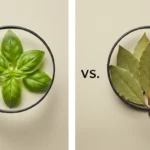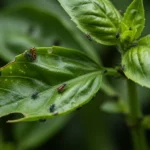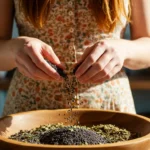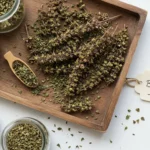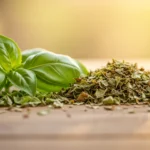Eight years ago, a tiny basil seedling, barely reaching my fingertip, sparked a gardening journey for me, Kalsoom Imran. I remember the day vividly – watching a lone bee, seemingly lost, land not on a flower, but on its leaves. It got me thinking, is basil plant good for bees?
Okay, let’s talk about basil. Not just for pesto, though, we’ll get to the buzz about how this humble herb can be a real superstar for our fuzzy, flying friends. I’ve always loved having basil in my garden, the smell alone is enough to make me happy, but I recently started wondering, does basil attract bees? Turns out, the answer is a resounding yes, and there’s a lot more to it than just a pretty plant.
Does Basil Attract Bees? Understanding the Connection
Basil: A Bee-Friendly Herb?
So, is basil really a bee-friendly herb? Absolutely! It’s not just a coincidence that you see bees flitting around your basil plants. There’s a real connection there, a little dance of nature happening right in your backyard.
I’ve noticed it myself, especially when my basil plants are in full bloom. It’s like they’ve put out a welcome mat for every bee in the neighborhood. It makes me feel good to know I’m providing something they need.
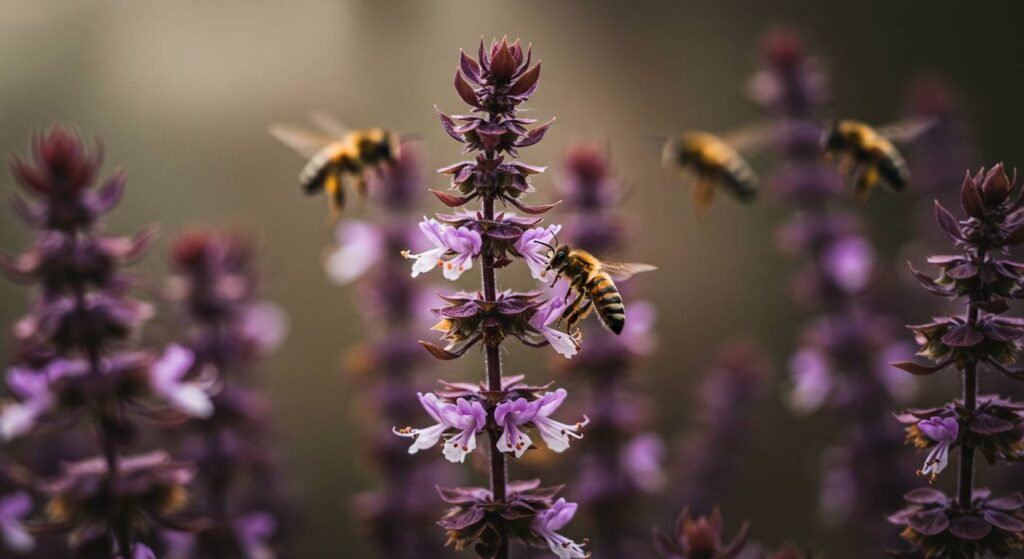
Is Basil Beneficial for Pollinators?
Beyond just attracting bees, is basil actually beneficial for other pollinators? The answer is a definite yes. While bees are the main focus here, basil also draws in other beneficial insects, like hoverflies and butterflies.
These little guys are all part of the same team, working together to keep our gardens healthy and thriving. It’s a whole ecosystem at work, and basil plays a key role in it. This is why I’ve started to think of my garden as a little haven for all sorts of pollinators, and basil is definitely one of the main attractions.
Why Bees Love Basil: Exploring the Benefits
Do Bees Like Basil Flowers? The Allure of Basil Blooms
Now, let’s get into the nitty-gritty. Do bees like basil flowers? You bet they do! The flowers are where the real magic happens. They are the source of nectar and pollen, the bee’s equivalent of a five-star restaurant. The tiny blooms, often overlooked by us, are a beacon for bees. I’ve spent many afternoons just watching the bees happily buzzing around my basil flowers, and it’s a sight that never gets old.
Basil as Bee Forage: A Source of Sustenance
When we talk about basil as bee forage, we’re talking about it as a food source for bees. It’s a place where bees can go to fuel up. Think of it as a roadside diner for pollinators, offering a much-needed break and a tasty meal. This is especially important in areas where other food sources might be scarce. My basil plants have become a regular stop for the local bee population, and I’m happy to provide.
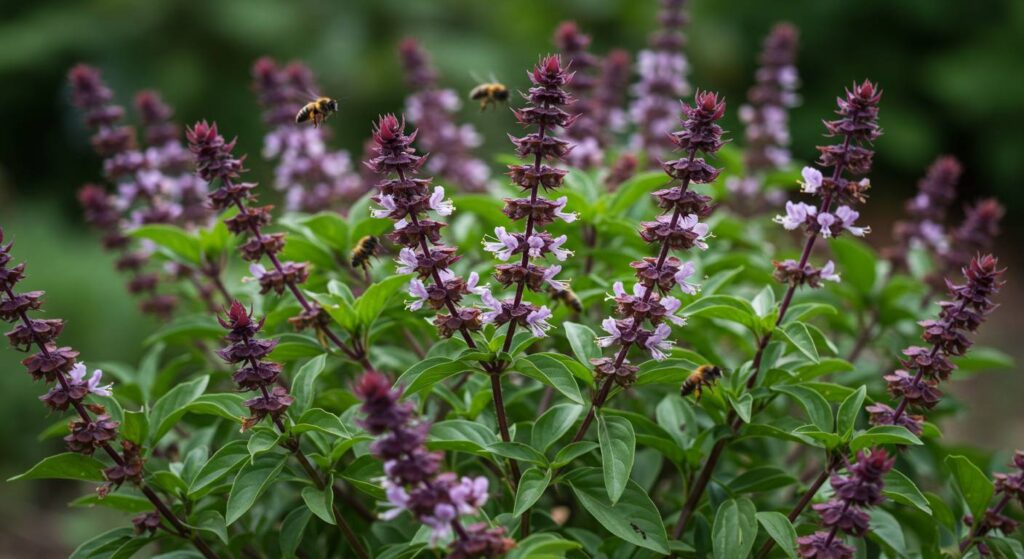
Basil Nectar for Bees: A Sweet Treat
The nectar produced by basil flowers is like a sweet treat for bees. It’s a sugary liquid that gives bees the energy they need to fly around and do their important work of pollination. The basil nectar for bees is a crucial part of their diet, and it’s what keeps them going. I always feel a little thrill when I see a bee dive headfirst into a basil flower, knowing it’s getting a much-needed energy boost.
Basil Pollen for Bees: Essential for Bee Health
But it’s not just nectar that basil provides. The basil pollen for bees is also essential. Pollen is a source of protein and other nutrients that bees need to grow and thrive. It’s like the bee’s version of a protein shake, helping them stay strong and healthy. This combination of nectar and pollen makes basil a powerhouse of nutrition for bees.
Basil and Honeybees: A Symbiotic Relationship
Basil and Honey Production: Does Basil Contribute?
Now, let’s talk about honey. Basil for honey production: does it contribute? While basil isn’t a primary honey source like clover or wildflowers, it can certainly contribute to the overall flavor and quality of honey, especially in areas where basil is abundant. The bees will incorporate basil nectar and pollen into their honey, giving it a unique, slightly herbal note. I love the idea that my garden might be contributing to the local honey supply, even in a small way.
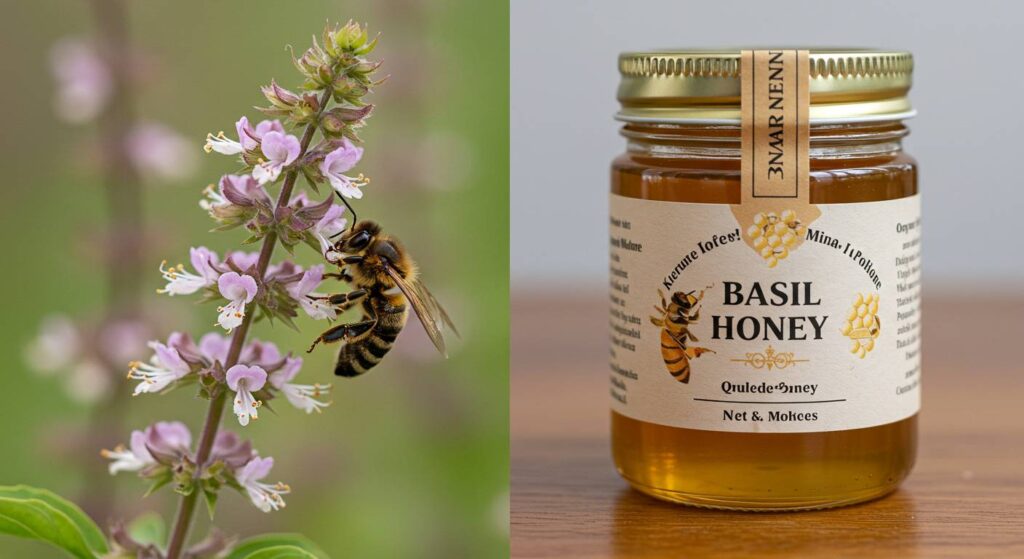
Basil for Bee Habitat: Creating a Buzzing Environment
Beyond just food, basil can also contribute to a better basil for bee habitat. When you have a patch of basil in your garden, you’re creating a little oasis for bees. It’s a place where they can find food, shelter, and a sense of safety. I’ve noticed more bees hanging around my garden since I started growing basil, and it’s clear they appreciate the little haven I’ve created.
Planting Basil for Bees: Creating a Pollinator-Friendly Garden
Basil Plant for Bee Garden: A Simple Addition
Adding a basil plant for bee garden is one of the easiest things you can do to help pollinators. It doesn’t take much effort, and the rewards are huge. You don’t need a huge garden; even a small pot of basil on your balcony can make a difference. I started with just a few basil plants, and now I can’t imagine my garden without them.
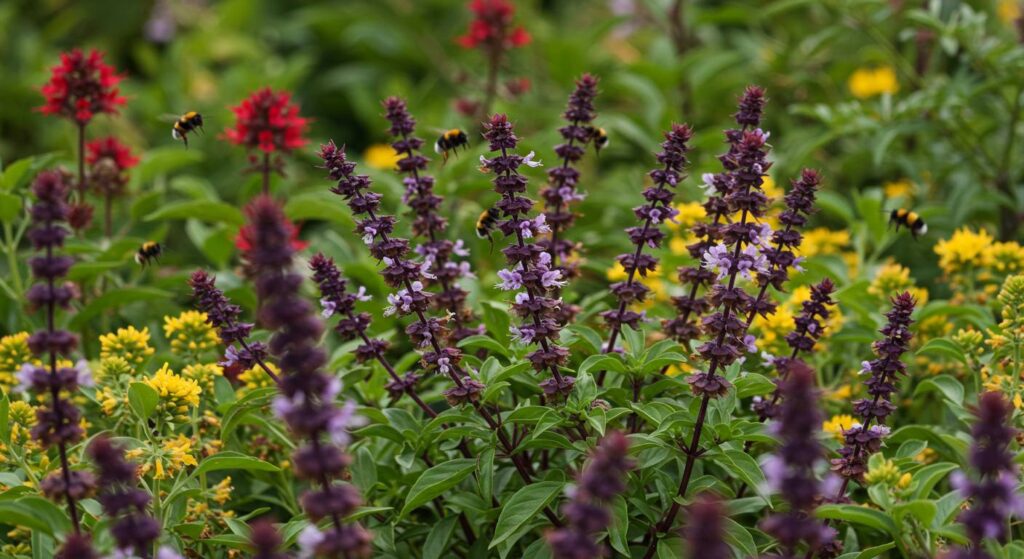
Pollinator Friendly Basil: Choosing the Right Variety
Not all basil is created equal when it comes to attracting bees. Some varieties are more pollinator friendly basil than others. Look for varieties that produce lots of flowers, like Thai basil or holy basil. These tend to be more attractive to bees than some of the more common sweet basil varieties. I’ve found that the more flowers, the more bees I get, so I always try to choose varieties that are known for their blooms.
Basil Bee Garden Plant: Integrating Basil into Your Landscape
Integrating basil bee garden plant into your landscape can be as simple as planting it alongside your other herbs and flowers. You can create a beautiful and functional garden that not only looks great but also supports your local bee population. I love the way my basil plants add a touch of green and fragrance to my garden, and knowing that they are helping bees makes it even better.
Basil’s Role in Bee Health and the Ecosystem
Basil and Bee Health: Supporting Healthy Bee Populations
The presence of basil in your garden can directly impact basil and bee health. By providing a reliable source of food, you are helping to support healthy bee populations. This is especially important given the challenges that bees are facing today, like habitat loss and pesticide use. I feel like I’m doing my small part to help these important creatures thrive.
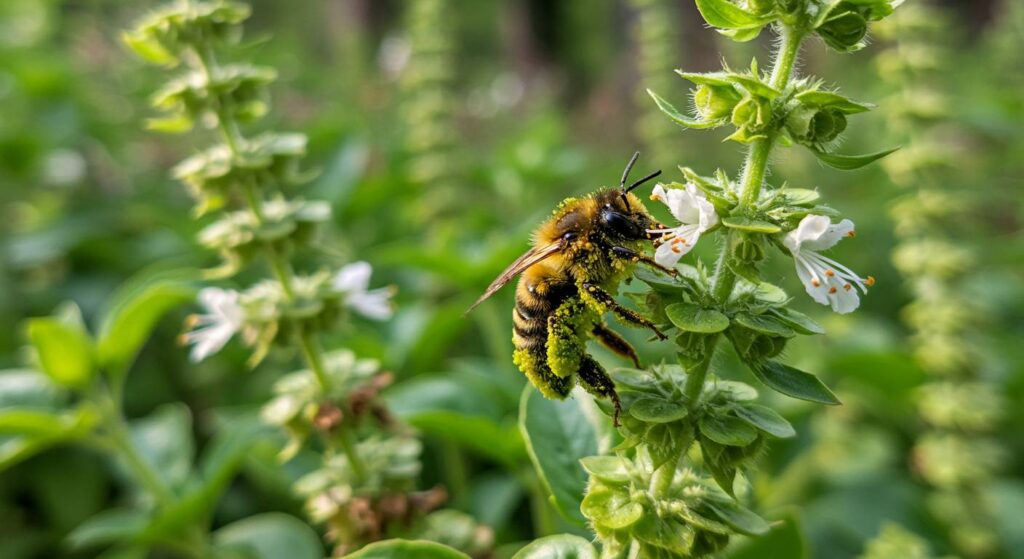
Is Basil Good for Bee Population? A Positive Contribution
So, is basil good for bee population? Absolutely! Every little bit helps, and planting basil is a simple and effective way to make a positive contribution. It’s not going to solve all the problems facing bees, but it’s a step in the right direction. I’m always looking for ways to help the environment, and basil has become one of my go-to plants for this purpose.
Basil Plant Beneficial Insects: Beyond Just Bees
It’s also worth noting that basil plant beneficial insects beyond just bees. It attracts a variety of pollinators and other beneficial insects that help keep your garden healthy and balanced. These insects can help control pests and reduce the need for harmful chemicals. It’s like having a natural pest control system right in your backyard.
Understanding Basil’s Attraction for Bees
Bees Visit Basil: Observing the Interaction
One of the coolest things about growing basil is watching the bees interact with it. Bees visit basil all the time in my garden, and it’s fascinating to observe their behavior. They move from flower to flower, collecting nectar and pollen, and it’s clear that they are enjoying their time there. It’s a little glimpse into the natural world, and it’s something I never tire of watching.
Basil Attracting Pollinators: More Than Just Bees
While bees are the star of the show, basil attracting pollinators goes beyond just our fuzzy friends. Butterflies, hoverflies, and other beneficial insects are also drawn to basil flowers. This diversity of pollinators is important for a healthy ecosystem, and basil helps support this. I love seeing all the different types of insects that visit my basil plants.
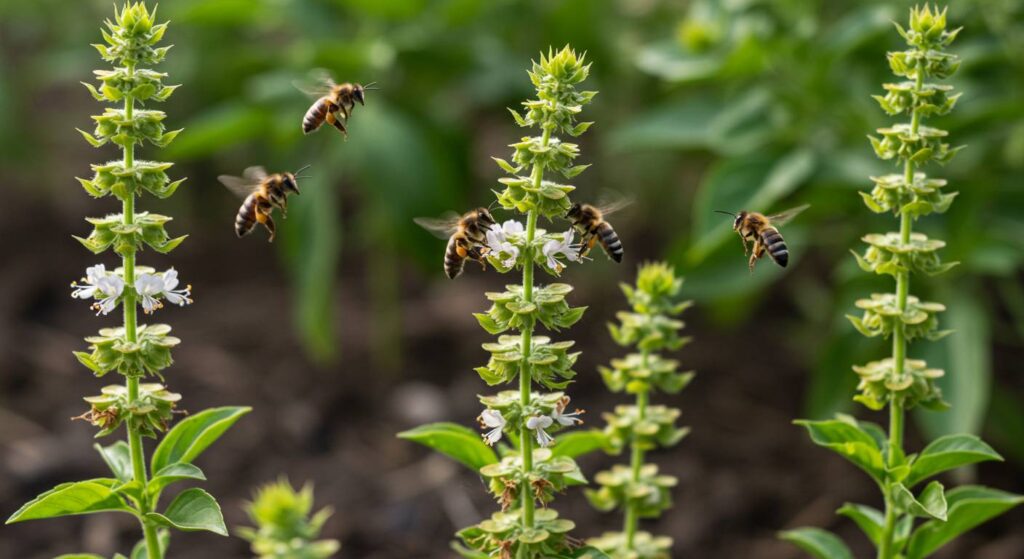
Basil Bee Food Source: A Valuable Resource
When it comes down to it, basil is a valuable basil bee food source. It’s a reliable and nutritious option for bees, offering both nectar and pollen. In areas where other food sources are scarce, basil can be a lifesaver for bees. I’ve come to think of my basil plants as a crucial part of the local bee’s diet.
Bee Loving Basil: A Gardener’s Choice for Bees
If you’re a gardener who cares about bees, bee loving basil should be at the top of your list. It’s easy to grow, it’s beneficial for bees, and it’s delicious for us too! It’s a win-win situation. I can’t imagine my garden without basil, and I know the bees feel the same way.
Conclusion: Basil’s Value for Pollinators
Basil: A Worthwhile Addition for Bees and Your Garden
So, is basil good for bees? Absolutely, without a doubt. It’s a worthwhile addition to any garden, providing food, habitat, and a sense of well-being for our pollinator friends. It’s a simple way to make a positive impact on the environment, while also enjoying the beauty and benefits of this wonderful herb. I encourage everyone to plant some basil and see for themselves the magic it brings to your garden.
It’s not just about the pesto; it’s about supporting the delicate balance of nature, one basil plant at a time. You can learn more on our blog. Also, be sure to know when basil flowers. If you’re looking for what herbs to plant with basil, we have you covered. It’s also worth noting why people plant basil in the backyard. You can also check out companion plants for basil. Finally, you might want to know how to prevent basil from bolting.
